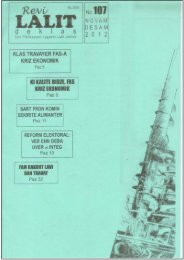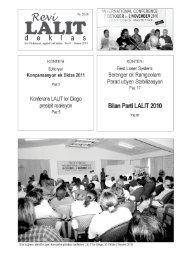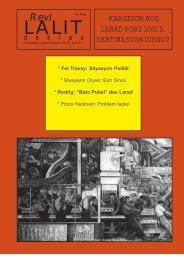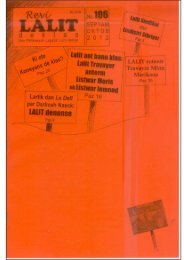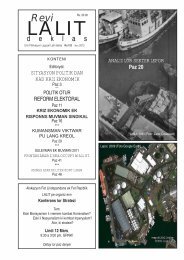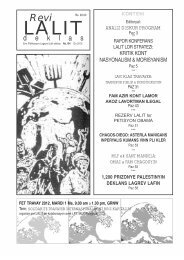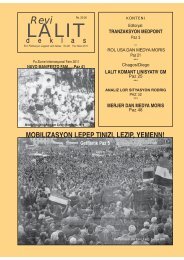Against communalism of the best-loser system - Lalit Mauritius
Against communalism of the best-loser system - Lalit Mauritius
Against communalism of the best-loser system - Lalit Mauritius
Create successful ePaper yourself
Turn your PDF publications into a flip-book with our unique Google optimized e-Paper software.
In <strong>the</strong> United States, so disillusioned or disenfranchised are <strong>the</strong> people that only half <strong>of</strong> <strong>the</strong><br />
people even bo<strong>the</strong>r to cast <strong>the</strong>ir votes in a country still bound by a Constitution more-or-less unamended<br />
since <strong>the</strong> original 1791 one written by half-a-dozen slave-owners and half-a-dozen<br />
gran komersan.<br />
In Russia, <strong>the</strong> people have seen all <strong>the</strong> economic and social rights that were won during <strong>the</strong><br />
Revolution completely destroyed, and replaced by a chaotic capitalist <strong>system</strong> run now by a<br />
newly-born mafia. The President has a great deal <strong>of</strong> constitutional power but, although elected,<br />
is so ill he can hardly be capable <strong>of</strong> commanding this autocratic power.<br />
In Britain <strong>the</strong> head <strong>of</strong> State is still one <strong>of</strong> a “caste” <strong>of</strong> heads <strong>of</strong> State. The House <strong>of</strong> Lords, which<br />
has hereditary members, has just blocked a law passed in <strong>the</strong> House <strong>of</strong> Commons.<br />
In France, <strong>the</strong> “egalité” part <strong>of</strong> <strong>the</strong> “Liberté, Egalité et Fraternité” <strong>of</strong> <strong>the</strong> Revolution has long<br />
been lost along <strong>the</strong> way, whichever party is in power.<br />
In India <strong>the</strong> party that was elected is very closely run by a communalist organization (<strong>the</strong> RSS),<br />
which was not elected by anyone.<br />
In South Africa, <strong>the</strong> first free elections have seen so little change for <strong>the</strong> people in <strong>the</strong>ir<br />
everyday ability to control political reality, that a terrible anger has risen amongst <strong>the</strong> people.<br />
So <strong>the</strong> main electoral reform necessary − short <strong>of</strong> a new series <strong>of</strong> long overdue revolutions for<br />
deepening democratic control <strong>of</strong> society − is to address <strong>the</strong> question <strong>of</strong> <strong>the</strong> corruption <strong>of</strong> those<br />
elected and <strong>of</strong> <strong>the</strong>ir “not doing what <strong>the</strong>y were elected to do”.<br />
<strong>Lalit</strong>’s First Proposal<br />
In <strong>Lalit</strong>, we suggest that <strong>the</strong> most advanced form <strong>of</strong> democracy is that already used by <strong>the</strong><br />
people all over <strong>the</strong> world in associations and in trade unions: <strong>the</strong> principle is simple: <strong>the</strong><br />
membership (<strong>the</strong> electorate) elects a Committee ( a legislature) that in turn elects <strong>of</strong>fice bearers<br />
(an executive) that in turn elects a President (a Prime Minister). And whoever has <strong>the</strong> power to<br />
elect someone has <strong>the</strong> power to recall that person.<br />
This is <strong>the</strong> major electoral reform necessary. This is <strong>the</strong> reform that might help to get some form<br />
<strong>of</strong> accountability and control over those elected.<br />
So, <strong>the</strong> basic change we want is for all electors to elect <strong>the</strong> members <strong>of</strong> <strong>the</strong> National Assembly,<br />
who in turn elect (we suggest) 15 Ministers, who in turn elect a Prime Minister. Then when a<br />
Prime Minister falls into Minority in his Cabinet, he can be recalled. When a Cabinet falls into<br />
Minority in <strong>the</strong> National Assembly, it (or any one Minister) can be recalled, and when <strong>the</strong><br />
National Assembly (or any member) falls into a Minority in his Constituency, <strong>the</strong>y (or he or<br />
she) can be recalled by an electoral petition in good and due form.<br />
This principle <strong>of</strong> recall must take predominance over any necessity to have proportional<br />
representation in <strong>the</strong> National Assembly. It is this principle <strong>of</strong> recall that acts so as to prevent<br />
any elected person giving in to moneyed or powerful lobbies, or being “bought over”, bribed<br />
over, or silenced by such lobbies.<br />
At present <strong>the</strong> Constitution <strong>of</strong> <strong>Mauritius</strong> allows revocation <strong>of</strong> Members <strong>of</strong> <strong>the</strong> National<br />
Assembly without any democratic procedure at all − under Section 35 (read with Section 34) <strong>of</strong><br />
<strong>the</strong> Constitution.<br />
What is important to <strong>Lalit</strong> is <strong>the</strong> political possibility <strong>of</strong> democratic recall, and thus <strong>the</strong><br />
process <strong>of</strong> accountability it establishes. This possibility in itself can change <strong>the</strong> balance<br />
<strong>of</strong> forces in favour <strong>of</strong> <strong>the</strong> electorate.<br />
The historical necessity to do away with communal classification<br />
<strong>Lalit</strong> believes that <strong>the</strong> history in <strong>Mauritius</strong> <strong>of</strong> Proportional Representation is a nasty one,<br />
peculiar to a post-slave society, where race and communal classification by society was <strong>the</strong><br />
raison d’etre for <strong>the</strong> failed “PR” project. Proportional Representation, as a “projet” in our<br />
history, involved what were called ‘separate electoral lists’ for each so-called ‘community’, and<br />
reserved seats for each so-called ‘community’. Proportional Representation was thus curiously<br />
<strong>the</strong> enemy <strong>of</strong> ‘citizenship’.<br />
After <strong>the</strong> “Down with PR” mass mobilization before Independence, <strong>the</strong> first-past-<strong>the</strong>-post<br />
<strong>system</strong> fortunately triumphed against this original “proportional representation”, but with one<br />
communalist concession: <strong>the</strong> communal <strong>best</strong>-<strong>loser</strong> <strong>system</strong> we got landed with in <strong>the</strong> Britishmade<br />
Constitution. This <strong>best</strong> <strong>loser</strong> <strong>system</strong> involved



